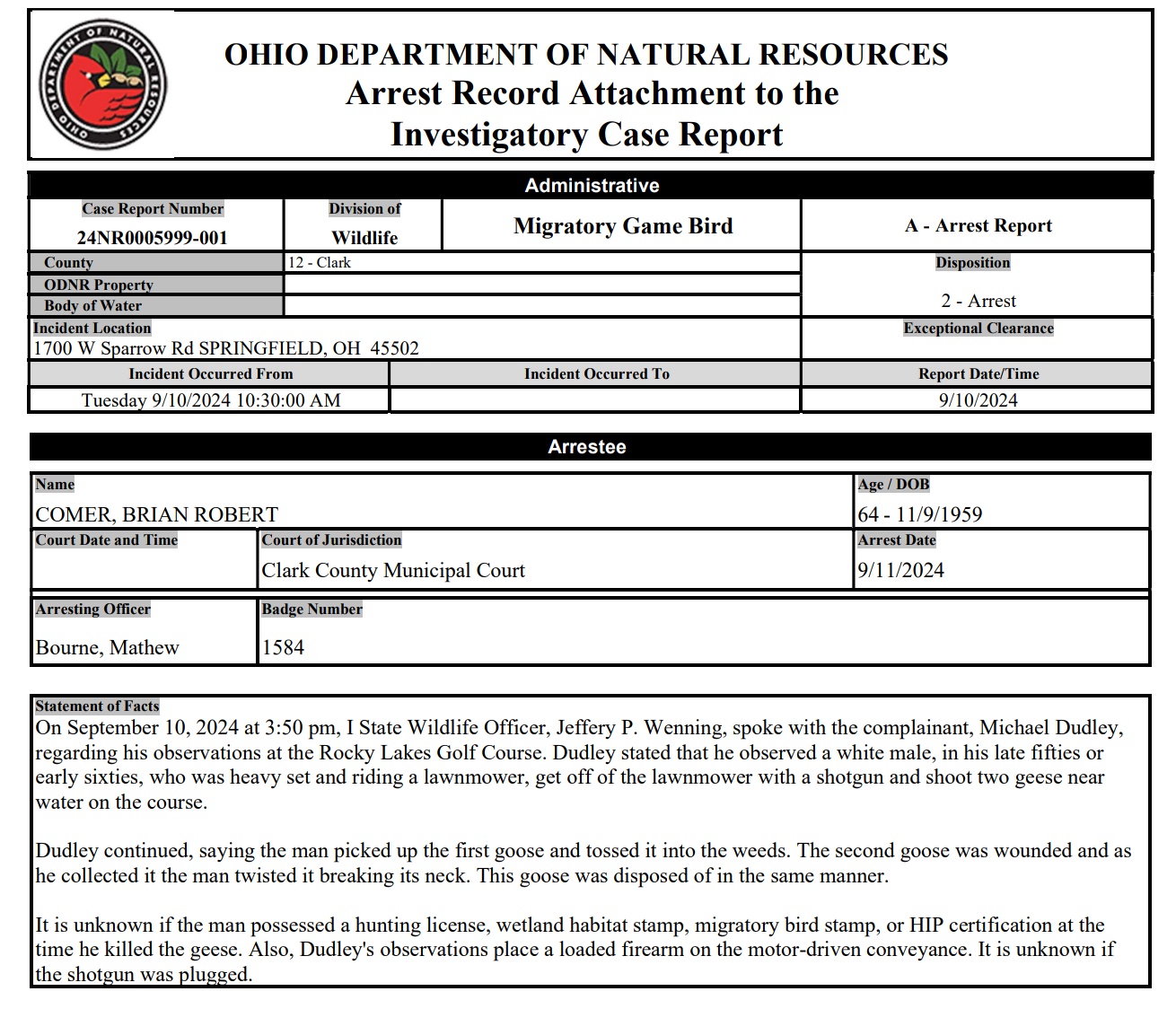Pets For Dinner
-
All I know is putting Haitians in slavelike conditions has NEVER turned out well.
-
-
That metal shop owner might end up being branded as a modern slave holder. That would be a shame.
When he was making those remarks about how awesome his Haitian workers were, he probably felt confident that he was self-identifying as an inclusive, progressive person.
-
Gosh darn
Haitianswhite US males!!!!A 64-year-old white man in Springfield, Ohio, was accused of illegally hunting geese at a golf course pond
-
Gosh darn
Haitianswhite US males!!!!A 64-year-old white man in Springfield, Ohio, was accused of illegally hunting geese at a golf course pond
@taiwan_girl said in Pets For Dinner:
Gosh darn
Haitianswhite US males!!!!A 64-year-old white man in Springfield, Ohio, was accused of illegally hunting geese at a golf course pond
Canada Geese are flying rats.
Though killing them is illegal, I celebrate the demise of every single one.
-
Gosh darn
Haitianswhite US males!!!!A 64-year-old white man in Springfield, Ohio, was accused of illegally hunting geese at a golf course pond
@taiwan_girl said in Pets For Dinner:
Gosh darn
Haitianswhite US males!!!!A 64-year-old white man in Springfield, Ohio, was accused of illegally hunting geese at a golf course pond
And you don’t see the problem with it, do you?
-
Let me give you a hint, the Haitians with geese/ducks HAS been documented and not really cared about, even though it is illegal.
-
I know someone, I dare not name who that is, who had a Canada Geese problem at his vacation home in a nearby state. They shit all over the pool deck, intimidated his 4 daughters and were aggressive about anyone walking on their turf.
Said person, and I am implicating no one, purchased a CO2 powered BB gun to ... discourage the geese from nesting and hanging out around his pool. Though none of the geese were injured, the "plonk" of a BB hitting one of the flying rats was a strong disincentive for them to move to a different location.
Not naming names...


-
The guy was absolutely correct to be arrested and charged. The problem is that the migrants (and yes, they are doing this) aren’t. They aren’t being charged for driving cars with no or expired tags. No safety inspections. They aren’t being charged for public drunkenness unless it’s egregious, or smaller scale fights, or any of a large number of misdemeanors.
-
They aren’t being charged for driving cars with no or expired tags. No safety inspections. They aren’t being charged for public drunkenness unless it’s egregious, or smaller scale fights, or any of a large number of misdemeanors.
In the US would not all of those infractions listed fall under State level enforcement and jurisdiction? If that’s the case the problem lies with the State Administration not Federal authorities.
Other than fisticuffs involving assault and battery charges all what you have listed here come under the purview of provincial statutes. In the case of the geese and ducks being harvested though additional federal charges might be applied under the Migratory Birds Act. In any event all the items would be enforced and prosecuted under provincial authority.
-
They aren’t being charged for driving cars with no or expired tags. No safety inspections. They aren’t being charged for public drunkenness unless it’s egregious, or smaller scale fights, or any of a large number of misdemeanors.
In the US would not all of those infractions listed fall under State level enforcement and jurisdiction? If that’s the case the problem lies with the State Administration not Federal authorities.
Other than fisticuffs involving assault and battery charges all what you have listed here come under the purview of provincial statutes. In the case of the geese and ducks being harvested though additional federal charges might be applied under the Migratory Birds Act. In any event all the items would be enforced and prosecuted under provincial authority.
@Renauda said in Pets For Dinner:
They aren’t being charged for driving cars with no or expired tags. No safety inspections. They aren’t being charged for public drunkenness unless it’s egregious, or smaller scale fights, or any of a large number of misdemeanors.
In the US would not all of those infractions listed fall under State level enforcement and jurisdiction? If that’s the case the problem lies with the State Administration not Federal authorities.
Other than fisticuffs involving assault and battery charges all what you have listed here come under the purview of provincial statutes. In the case of the geese and ducks being harvested though additional federal charges might be applied under the Migratory Birds Act. In any event all the items would be enforced and prosecuted under provincial authority.
Yep. Dollars spent go further on a local level.
Ongoing conversation with an old HS friend that’s a cop in Charleroi. Word from his bosses is that they don’t want migrants getting arrested for petty crap. It’s couched under a veneer of being compassionate and understanding of cultural differences, yada yada yada… But what’s generally understood is that 2 misdemeanors gets your TPS status revoked. According to him, if the guys on the street were allowed to do their jobs and they started policing these guys, and the Commonwealth’s Attorney actually prosecuted, that the entire migrant community would lose their TPS status. If that happens, all kinds of hell breaks loose. The chances that ICE comes in to remove these guys after their convictions are 0. So now you have 2000 people that don’t have legal status there and they truly are illegal. Living there illegally leads to worse crimes being committed and things go downhill fast.
On top of that, you would have groups like CASA and such coming after the police in the courtroom crying racism and inequitable enforcement of the law. Even if the Department wins in the courts, they still lose. The borough doesn’t have the type of money to defend itself from the avalanche of special interest groups. Plus, Wellington has most of the town officials in their pocket to avoid inspection of the habitats they are renting out as well as their general business practices.
It’s a real fucking mess. At the same time, the small police force is pissed that they can’t do their jobs. Pissed cops means trouble for somebody, and since they have to ignore the petty crimes in the migrant community, they take it out on the others.
A migrant’s car can be driving without a license plate and nothing happens. But that officer sees your inspection is past due? No chance that you just get a warning… It’s just making the situation worse.
-
So an interesting "only on TNCR" story: our old friend Apple told me that she once ate a cat. When she was a kid, Apple and her brother went out "hunting" with a bow and arrow. They shot and killed a cat. Her brother then came up with the dictum of "you gotta eat what you kill," so they went into the woods near their house and cooked the cat and ate at least some of it.
-
@Renauda said in Pets For Dinner:
They aren’t being charged for driving cars with no or expired tags. No safety inspections. They aren’t being charged for public drunkenness unless it’s egregious, or smaller scale fights, or any of a large number of misdemeanors.
In the US would not all of those infractions listed fall under State level enforcement and jurisdiction? If that’s the case the problem lies with the State Administration not Federal authorities.
Other than fisticuffs involving assault and battery charges all what you have listed here come under the purview of provincial statutes. In the case of the geese and ducks being harvested though additional federal charges might be applied under the Migratory Birds Act. In any event all the items would be enforced and prosecuted under provincial authority.
Yep. Dollars spent go further on a local level.
Ongoing conversation with an old HS friend that’s a cop in Charleroi. Word from his bosses is that they don’t want migrants getting arrested for petty crap. It’s couched under a veneer of being compassionate and understanding of cultural differences, yada yada yada… But what’s generally understood is that 2 misdemeanors gets your TPS status revoked. According to him, if the guys on the street were allowed to do their jobs and they started policing these guys, and the Commonwealth’s Attorney actually prosecuted, that the entire migrant community would lose their TPS status. If that happens, all kinds of hell breaks loose. The chances that ICE comes in to remove these guys after their convictions are 0. So now you have 2000 people that don’t have legal status there and they truly are illegal. Living there illegally leads to worse crimes being committed and things go downhill fast.
On top of that, you would have groups like CASA and such coming after the police in the courtroom crying racism and inequitable enforcement of the law. Even if the Department wins in the courts, they still lose. The borough doesn’t have the type of money to defend itself from the avalanche of special interest groups. Plus, Wellington has most of the town officials in their pocket to avoid inspection of the habitats they are renting out as well as their general business practices.
It’s a real fucking mess. At the same time, the small police force is pissed that they can’t do their jobs. Pissed cops means trouble for somebody, and since they have to ignore the petty crimes in the migrant community, they take it out on the others.
A migrant’s car can be driving without a license plate and nothing happens. But that officer sees your inspection is past due? No chance that you just get a warning… It’s just making the situation worse.
-
@Renauda said in Pets For Dinner:
It’s a real fucking mess….
An understatement.
And at the heart of it you have these Haitians that are basically in indentured servitude. These employment agencies charge them them a fortune to get their TPS status approved, then put them in Blech level jobs making what is minimum wage in most states, then take $3 off the top as their fee, then take another $2 per hour to go towards their TPS documentation fee. Another $1 to cover FICA, and pay these guys $9 an hour. But wait! There’s more. The guys are charged $250 per bed in a run down dilapidated house that’s overcrowded, and another $35 per week for transport to work. Oh, and $400 per month for mandatory insurance… the guys are left with enough money for food, some beer, and maybe a bag of marijuana. You can see where this goes…
-
Christopher F. Rufo, Christina Buttons
A Troubled Place
In Charleroi, Pennsylvania, the local population grapples with a surge of Haitian migrants.
/ Eye on the News / Politics and law, The Social Order
Oct 07 2024
/ Share
Charleroi, Pennsylvania, is a deeply troubled place. The former steel town, built along a stretch of the Monongahela River, south of Pittsburgh, has experienced the typical Rust Belt rise and fall. The industrial economy, which had turned it into something resembling a company town, hollowed out after the Second World War. Some residents fled; others succumbed to vices. The steel mills disappeared. Two drug-abuse treatment centers have since opened their doors.The town’s population had steadily declined since the middle of the twentieth century, with the most recent Census reporting slightly more than 4,000 residents. Then, suddenly, things changed. Local officials estimate that approximately 2,000 predominantly Haitian migrants have moved in. The town’s Belgium Club and Slovak Club are mostly quiet nowadays, while the Haitians and other recent immigrants have quickly established their presence, even dominance, in a dilapidated corridor downtown.
This change—the replacement of the old ethnics with the new ethnics—is an archetypal American story. And, as in the past, it has caused anxieties and, at times, conflict.
The municipal government has felt the strain. The town, already struggling with high rates of poverty and unemployment, has been forced to assimilate thousands of new arrivals. The schools now crowd with new Haitian pupils, and have had to hire translators and English teachers. Some of the old pipes downtown have started releasing the smell of sewage. And, according to a town councilman, there is a growing sense of trepidation about the alarming number of car crashes, with some vehicles reportedly slamming into buildings.
Among the city’s old guard, frustrations are starting to boil over. Instead of being used to revitalize these communities, these residents argue, resources get redirected to the new arrivals, who undercut wages, drive rents up, and, so far, have failed to assimilate. Worst of all, these residents say, they had no choice—there was never a vote on the question of migration; it simply materialized.
Former president Donald Trump, echoing the sentiments of some of Charleroi’s native citizens, has cast the change in a sinister light. As he told the crowd at a recent rally in Indiana, Pennsylvania, “it takes centuries to build the unique character of each state. . . . But reckless migration policy can change it quickly and permanently.” Progressives, as expected, countered with the usual arguments, claiming that Trump was stoking fear, inciting nativist resentment, and even putting the Haitian migrants in danger.
Neither side, however, seems to have grappled with the mechanics of Charleroi’s abrupt transformation. How did thousands of Haitians end up in a tiny borough in Western Pennsylvania? What are they doing there? And cui bono—who benefits?
The answers to these questions have ramifications not only for Charleroi, but for the general trajectory of mass migration under the Biden administration, which has allowed more than 7 million migrants to enter the United States, either illegally, or, as with some 309,000 Haitians, under ad hoc asylum rules.
The basic pattern in Charleroi has been replicated in thousands of cities and towns across America: the federal government has opened the borders to all comers; a web of publicly funded NGOs has facilitated the flow of migrants within the country; local industries have welcomed the arrival of cheap, pliant labor. And, under these enormous pressures, places like Charleroi often revert to an older form: that of the company town, in which an open conspiracy of government, charity, and industry reshapes the society to its advantage—whether the citizens want it or not.
The best way to understand the migrant crisis is to follow the flow of people, money, and power—in other words, to trace the supply chain of human migration. In Charleroi, we have mapped the web of institutions that have facilitated the flow of migrants from Port-au-Prince. Some of these institutions are public and, as such, must make their records available; others, to avoid scrutiny, keep a low profile.
The initial, and most powerful, institution is the federal government. Over the past four years, Customs and Border Patrol has reported hundreds of thousands of encounters with Haitian nationals. In addition, the White House has admitted more than 210,000 Haitians through its controversial Humanitarian Parole Program for Cubans, Haitians, Nicaraguans, and Venezuelans (CHNV), which it paused in early August and has since relaunched. The program is presented as a “lawful pathway,” but critics, such as vice presidential candidate J. D. Vance, have called it an “abuse of asylum laws” and warned of its destabilizing effects on communities across the country.
The next link in the web is the network of publicly funded NGOs that provide migrants with resources to assist in travel, housing, income, and work. These groups are called “national resettlement agencies,” and serve as the key middleman in the flow of migration. The scale of this effort is astounding. These agencies are affiliated with more than 340 local offices nationwide and have received some $5.5 billion in new awards since 2021. And, because they are technically non-governmental institutions, they are not required to disclose detailed information about their operations.
In Charleroi, one of the most active resettlement agencies is Jewish Family and Community Services Pittsburgh. According to a September Pittsburgh Post-Gazette report, JFCS staff have been traveling to Charleroi weekly for the past year and a half to resettle many of the migrants. The organization has offered to help migrants sign up for welfare programs, including SNAP, Medicaid, and direct financial assistance. While JFCS Pittsburgh offers “employment services“ to migrants, it denies any involvement with the employer and staffing agencies that were the focus of our investigation.
And yet, business is brisk. In 2023, JFCS Pittsburgh reported $12.5 million in revenue, of which $6.15 million came directly from government grants. Much of the remaining funding came from other nonprofits that also get federal funds, such as a $2.8 million grant from its parent organization, HIAS. And JFCS’s executives enjoy generous salaries: the CEO earned $215,590, the CFO $148,601, and the COO $125,218—all subsidized by the taxpayer.
What is next in the chain? Business. In Charleroi, the Haitians are, above all, a new supply of inexpensive labor. A network of staffing agencies and private companies has recruited the migrants to the city’s factories and assembly lines. While some recruitment happens through word-of-mouth, many staffing agencies partner with local nonprofits that specialize in refugee resettlement to find immigrants who need work.
At the center of this system in Charleroi is Fourth Street Foods, a frozen-food supplier with approximately 1,000 employees, most of whom work on the assembly line. In an exclusive interview, Chris Scott, the CEO and COO of Fourth Street Barbeque (the legal name of the firm that does business as Fourth Street Foods) explained that his company, like many factory businesses, has long relied on immigrant labor, which, he estimates, makes up about 70 percent of its workforce. The firm employs many temporary workers, and, with the arrival of the Haitians, has found a new group of laborers willing to work long days in an industrial freezer, starting at about $12 an hour.
Many of these workers are not directly employed by Fourth Street Foods. Instead, according to Scott, they are hired through staffing agencies, which pay workers about $12 an hour for entry-level food-processing roles and bill Fourth Street Foods over $16 per hour to cover their costs, including transportation and overhead. (The average wage for an entry-level food processor in Washington County was $16.42 per hour in 2023.)
According to a Haitian migrant who worked at Fourth Street and a review of video footage, three staffing agencies—Wellington Staffing Agency, Celebes Staffing Services, and Advantage Staffing Agency—are key conduits for labor in the city. None have websites, advertise their services, or appear in job listings. According to Scott, Fourth Street Foods relies on agencies to staff its contract workforce, but he declined to specify which agencies, citing nondisclosure agreements.
The final link is housing. And here, too, Fourth Street Foods has an organized interest. During the Covid-19 pandemic, Scott said, Fourth Street Foods was “scrambling” to find additional workers. The owner of the company, David Barbe, stepped in, acquiring and renovating a “significant number of homes” to provide housing for his workforce. A property search for David Barbe and his other business, DB Rentals LLC, shows records of more than 50 properties, many of which are concentrated on the same streets.
After the initial purchases, Barbe required some of the existing residents to vacate to make room for newcomers. A single father, who spoke on condition of anonymity, was forced to leave his home after it was sold to DB Rentals LLC in 2021. “[W]e had to move out [on] very short notice after five years of living there and being great tenants,” he explained. Afterward, a neighbor informed him that a dozen people of Asian descent had been crammed into the two-bedroom home. They were “getting picked up and dropped off in vans.”
“My kids were super upset because that was the house they grew up in since they were little,” the man said. “It was just all a huge nightmare.”
In recent years, a debate has raged about “replacement migration,” which some left-wing critics have dubbed a racist conspiracy theory. But in Charleroi, “replacement” is a plain reality. While the demographic statistics have shifted dramatically in recent years, replacement happens in more prosaic ways, too: a resident moves away. Another arrives. The keys to a rental apartment change hands.
In one sense, this is unremarkable. Since the beginning, America has been the land of migration, replacement, and change. The original Belgian settlers of Charleroi were replaced by the later-arriving Slavic populations, who are now, in turn, being replaced by men and women from Port-au-Prince. The economy changed along the same lines. The steel plants shut down years ago. The glass factory, the last remaining symbol of the Belgian glass-makers, might suspend operations soon. The largest employer now produces frozen meals.
In another sense, however, legitimate criticisms can be made of what is happening in Charleroi. First, the benefits of mass migration seem to accrue to the organized interests, while citizens and taxpayers absorb the costs. No doubt, the situation is advantageous to David Barbe of Fourth Street Foods, who can pay $16 an hour to the agencies that employ his contract labor force, then recapture some of those wages in rent—just like the company towns from a century ago.
But for the old residents of Charleroi, who cherish their distinct heritage and fear that their quality of life is being compromised, it’s mostly downside. The evictions, the undercut wages, the car crashes, the cramped quarters, the unfamiliar culture: these are not trivialities, nor are they racist conspiracy theories. They are the signs of a disconcerting reality: Charleroi is a dying town that could not revitalize itself on its own, which made it the perfect target for “revitalization” by elite powers—the federal government, the NGOs, and their local satraps.
The key question in Charleroi is the fundamental question of politics: Who decides? The citizens of the United States, and of Charleroi, have been assured since birth that they are the ultimate sovereign. The government, they were told, must earn the consent of the governed. But the people of Charleroi were never asked if they wanted to submit their borough to an experiment in mass migration. Others chose for them—and slandered them when they objected.
The decisive factor, which many on the institutional Left would rather conceal, is one of power. Martha’s Vineyard, when faced with a single planeload of migrants, can evict them in a flash. But Charleroi—the broken man of the Rust Belt—cannot. This is the reality of replacement: the strong do what they can, and the weak do what they must.

